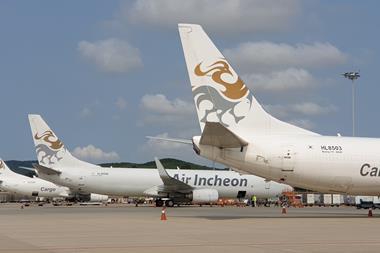Hong Kong’s Asia Airfreight Terminal (AAT) has introduced Radio-Frequency Identification (RFID) unit load device (ULD) tags for pre-packed cargo.
The new technology will speed up the cargo acceptance process by 45 seconds per shipment, said AAT, which claimed that it is the first terminal operator to use such RFID technology for pre-packed cargo at Hong Kong International Airport.
Previously, AAT’s operations for cargo acceptance of prepacked shipments required two levels of manual data entry, for weight and contour, at the truck dock and identification point. Data was entered into AAT’s cargo management system and supervisory control system.
Said AAT: “Applying RFID technology on the ULD tag [means that the] data entry process will take place only once, at the truck dock area. Once the tag has been tied on the prepacked shipment, data will be automatically captured when the shipment passes through the identification point.”
AAT added: “Through utilising RFID technology on ULD tags, data accuracy for the cargo acceptance process is ensured, with human errors being eliminated.
“The general practice of handling ULD tag is by hand-writing, where cargo acceptance operator writes the shipment information on the ULD tag, including flight number, weight, contour and destination, at the truck dock area.
“With this new technology applied, the computerized data entry process can ensure the data accuracy throughout the whole cargo acceptance process.”
Kuah Boon Kiam, general manager of AAT, said, "We are very pleased to have another innovative product brought to our valuable customers in this year. This RFID technology could definitely bring a new milestone for the air cargo industry in Hong Kong."










